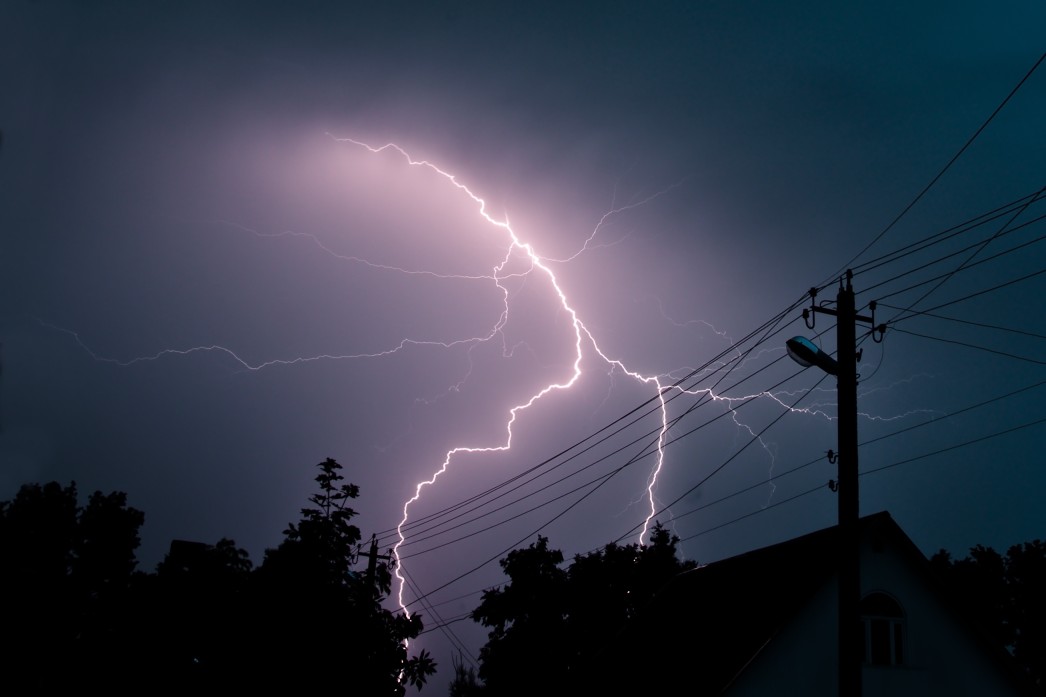
Heavy Rain, Flooding, and Chance of Severe Weather Staring Down the Southern U.S.
January 22, 2024
Posted: July 28, 2023 1:23 pm





Few weather phenomena are more intimidating and potentially as deadly as lightning. Researchers representing the Centers for Disease Control, which is often abbreviated simply as the CDC, have found that this weather event kills roughly 30 Americans each year and injures scores more.
Many people assume that merely moving indoors during severe meteorological occurrences like thunderstorms will provide adequate protection against lightning’s perils. Safety experts maintain that, while seeking shelter reduces one’s chances of sustaining injury or death, being indoors does not provide 100 percent guaranteed assurance and individuals still must adhere to strict safety protocols.
Aforementioned researchers have also concluded that nearly one-third of all lightning strikes on people occur indoors. In actuality, a home is built with structures capable of fostering the weather occurrence’s path inside.
Metal and metal wiring are often considered the biggest culprits. Buildings comprised of concrete typically shelter metal objects and wiring.
Additionally, lightning is often attracted to water and could therefore strike interior piping containing said resource. Lightning is defined as an electrostatic response occurring when the atmosphere is charged. Water is amongst electricity’s most effective conductors.
Fortunately, homeowners and residents might avoid injury or death resulting from an indoor lightning event by following safety precautions such as:
Lightning often reaches the ground through conduits like electrical wiring and circuitry. These channels provide the pathways enabling the proper powering of commonly used electronic devices, including phones, tablets, laptop and desktop computers, televisions, and stereos.
Therefore, when thunderstorms or lightning-producing events are imminently forecast or already occurring, individuals sheltered inside are implored to power down said devices, or at the very least, avoid said items until the offending weather passes.
That said, one should also realize that any electricity-processing device could pose a significant risk. This includes oft used appliances like clothes washing machines, dryers, and dishwashers. Even handheld apparatuses, like electric toothbrushes and hairdryers should be avoided before and during lightning storms.
Lightning also possesses the capacity to damage or destroy items like electronic entertainment equipment. Ergo, safety professionals recommend purchasing surge protecting devices and plugging said items into these safeguarding items.

The loud, clapping thunder, heavy winds, swirling rains, and intermittent thunderbolts can make for awe-inspiring sights. In turn, many people hunkered down indoors during said events heed to temptation and frequently peek out windows or even open doors to witness nature’s fury first hand.
Safety experts implore people to reconsider this behavior. These partitions are often equipped with metal framing and attachments like knobs and handles capable of attracting quick and abrupt lightning strikes.
The basement or any other area of an abode near large quantities of concrete should be avoided at all costs. As previously mentioned, said structures often house metal wiring and water piping. That said, scientists consider concrete an optimal electrical conductor on its own accord rendering said material even more dangerous.
The midst of a lightning storm is not the occasion to jump in a bath or shower. One must remember that water is one of the most efficient electrical conductors and bears an uncanny knack of attracting sources like lightning.
Safety experts even recommend not using sinks or toilets during said events. Unless one possesses medical conditions or simply cannot hold back, trips to the restroom should be held off until the weather clears.
Aside from electrical power, lightning carries tremendous physical strength and could easily break through a glass window or sliding door. Therefore, coverings like blinds should be firmly drawn prior to or at the beginning of a lightning-producing event. Such actions may limit breakage and curtail the injury risk associated with flying or shattered glass.
Thunderstorms and other lightning events often present in several waves. Ergo, homeowners and residents should not automatically assume they are out of the woods when the first wave clears. Said subjects are strongly encouraged to listen to all weather bulletins and not resume normal activities until said alerts have passed.
Meteorologists and safety professionals stress that lightning is unpredictable. Therefore, it may be impossible to completely prevent lightning from striking one’s home.
Chances may be reduced through the installation of lightning rods. These safety apparatuses are typically placed on a structure’s roof and hold the ability to direct lightning strikes away from the home.
Trees and shrubbery are also prime real estate for lightning strikes. Homeowners may limit direct blows by planting these items further away from the home’s borders.

January 21, 2024

January 19, 2024

January 18, 2024